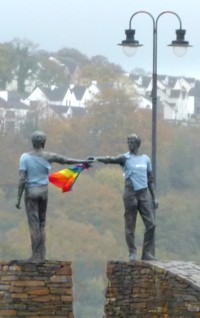Sligo
I guess that everybody in Sligo knows who W B Yeats was. His rooms in town are now a museum; his postmodern statue is in a prominent position near a landmark bank corner; and his grave is a place of pilgrimage for poetry 'tragics' on the road out of town.
As it happens, I was aware of Sligo from genealogical research. It's in an area over to Londonderry, with one of the greatest concentrations of McKie's in Ireland. But the Irish branch having my paternal Y chromosome are not closely related cousins. We are separated by at least ten generations, because five generations back my McKie ancestors came from Scotland and none of these went off to Ireland. They were Presbyterian and I strongly suspect that the Irish McKie's were somehow involved in the Elizabethan and or more likely Stewart 'Plantations' (see the history above...) which would put our last common ancestor at about 400 years ago. No doubt future genetic testing will reveal more.
Sligo bay is one of the best harbours in the north of the island and was known to the ancient Romans. The area has been inhabited since Neolithic times, at least seven millennia ago, and there are ancient tombs and other prehistoric remnants nearby.
Like many other towns Sligo was fortified by the Anglo-Normans against the wild Irish tribes. But in this case the fortification was insufficient and Sligo was soon overrun by the Irish O'Donnell's and later the O'Conor's, who controlled this important trading port throughout the middle ages. These Irish clans had close associations in Scotland and their chiefs seemed to travel between the two quite often. This would come to an end in Tudor times.
In the19th century Sligo was an important industrial port and became a rail head. It remains one of the best transport connected towns in Ireland.
It's also close to the border with Northern Ireland. In a more rational world the partition of Northern Ireland would have included sparsely populated County Donegal 32 Km to the north of Sligo that would have almost halved the length of the national border. Like Scotland this part of Ireland has a more rugged beauty and along the coast entire hillsides are scraped back to sheer rock by the last glaciation.
Near the centre of town are the ruins of Sligo Abbey, the Dominican Friary of Sligo. A plaque tells us:
|
Sligo Sligeach Wikipedia further informed me that: |
As ruins go, the Abbey is in quite good condition. It's been structurally stabilised with steel and has modern stairs to facilitate access to the upper levels. We spent a happy hour or so exploring and reading the inscriptions on the many gravestones on the site, some not so old. As was everything in town it was walking distance from the modern hotel, which turned out to be one of the best we stayed in, with a commodious room and good bathroom overlooking the River Garavogue. The river was home to a family of swans, and on the other bank was a pretty church. A check on-line told me it's Calry Parish Church (Church of Ireland) built in 1824. It's listed in the National Inventory of Architectural Heritage that tells us that it's very fine in many ways and with its pitched slate roof and octagonal steeple it: 'not only makes a valuable contribution to the streetscape but also to enhances the view from south of the river'.
See the Ireland Album - Click Here...
The Church's website is less informative about gross worldly things like: the architecture; the builder; or even the date. Although it did inform me that:
| Calry is a community-minded Church of Ireland church of all ages on a God-given journey. To help us we have the compass of God’s word the Bible, the companionship of the Lord Jesus and the comfort and conviction of the Holy Spirit to give us what we need when we need it.
And that: We are very glad of our partnership in the gospel with other churches in the Sligo area, both Church of Ireland and of other denominations. |
I was previously unaware that Holy Spirit has such utility - 'to give us what we need when we need it': May I have my own private jet - tomorrow? Or maybe just a Mercedes Benz?
|
Oh Lord, won't you buy me a Mercedes Benz?My friends all drive Porsches, I must make amendsWorked hard all my lifetime, no help from my friendsSo, oh, Lord, won't you buy me a Mercedes Benz? According to some, she was soon able to make the request in person. |
'Want' is clearly a different concept to 'need'. I suspect that in this context 'need' is equivalent to: 'get' - as in: to get cancer; to be swept away in a Tsunami; or to have one's child inexplicably killed.
Yet I applaud the ecumenical sentiment. If only it were so that all Christian denominations in Ireland are now truly 'as one' and have forever buried the sectarian hatchet. Yet the phrase: 'partnership in the gospel' gave me pause. Does it mean that those 'Romeish' things 'not supported by scripture' like: 'prayers for the dead'; and 'transubstantiation of the host', remain anathema? Get over it guys. Let people believe what they want to. You do.
Not far away, it was time to contemplate a much more ancient religion, that long preceded Zoroaster (Zarathustra), Moses and Budda, let alone those newcomers: Jesus and Muhammad.

